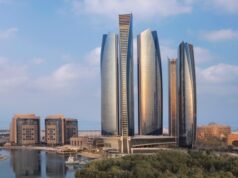
BETHESDA, MD.—With a full slate of 2025 environmental impact goals, keeping track of progress is a mammoth job for Marriott International given its approximately 8,000 properties. Leading the collection of that data with a team of experts to help her is Marriott’s Sarah Boll, Senior Director, Energy & Sustainability, U.S./Canada.
“We are the ones to gather data. We collect data on carbon intensity, water intensity, and waste,” Boll says. “Managing that data is a global responsibility. We do our best to clean it up and use it for target setting.”
As leader of the data acquisition team, Boll overseas data acquisition and quality, and provides a lot of tools and education around energy and water. It is within the Marriott Environmental Sustainability Hub (MESH) where data is kept and broken down by topics that are important to Marriott’s RFP process.
Utility Management Expertise
“We help to vet technologies,” Boll says. “We provide one on one consultation. All the managed properties have access to a utility management expert. My role is as leader of that team.” Energy procurement is one area where Boll and other Marriott associates assist.
Boll and her teams’ role at Marriott just got more important with the company’s announcement last week that it will commit to a science-based target and reach net-zero greenhouse gas emissions by no later than 2050.
According to the Science Based Targets Initiative, targets are considered “science-based” if they are in line with what the latest climate science deems necessary to meet the goals of the Paris Agreement—limiting global warming to 1.5°C above pre-industrial levels.
“If we can limit global warming by 1.5 degrees Celsius, we can limit the impact of climate change to the world,” Boll says.
As of its just released 2022 Serve 360 Report, Marriott had decreased its carbon intensity by 25.6 percent since 2016—on track toward its 2025 goal of 30 percent. Due to the impacts of Covid-19, Marriott experienced an increase of 4.7 percent in water intensity compared to 2016. Marriott was also behind on its 2025 goal of 45 percent waste-to-landfill (and 50 percent food waste) reduction from its 2016 baseline.
All About Building Efficiency
Getting to net-zero is all about efficiency.
“There are some pretty well-known levers to make buildings more efficient,” Boll says. “We need a transformation within the company itself—to bring the company to understand the target and to achieve it. To make it to net zero we must stop burning fossil fuels at the property and electrify. That lever needs to be supplied by green power.”
Just as location is critical to occupancy, so too is it important to green power access. Boll says there are some Marriott properties providing onsite power using solar, especially in Hawaii. Some are using combined heat and power even though that efficient technology uses natural gas as the fuel.
“There are properties taking a hard look at leak detection systems,” Boll says. “There are properties still doing the low-hanging fruit.”
For Boll, protecting the planet has been a life-long passion. “It goes back to when I grew up,” she says. “I grew up on a farm. I got to spend a lot of time outdoors. I chose ecology and the natural sciences to study.”
When asked what she enjoys most about her job, Boll says, “I am passionate about sustainability. It is great doing something you believe in. All my colleagues at Marriott are such hard working, passionate people.”
Glenn Hasek can be reached at greenlodgingnews@gmail.com.







